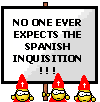Anybody not familiar with this book will find it very unnerving when it comes to certain entries. Those entries will be omitted unless a sticky is made explaining or suggesting parental guidance
for those under a select age group. I have already omitted the earliest entries, those of the church as she went through that period of Rome when the Caesars were gods, one Herod when proclaimed to be a god and accepted the title was immediately eaten by worms, falling dead on the spot.

:
An Account of the Inquisition
When the reformed religion began to diffuse the Gospel light throughout Europe, Pope Innocent III entertained great fear for the Romish Church. He accordingly instituted a number of inquisitors, or persons who were to make inquiry after, apprehend, and punish, heretics, as the reformed were called by the papists.
At the head of these inquisitors was one Dominic, who had been canonized by the pope, in order to render his authority the more respectable. Dominic, and the other inquisitors, spread themselves into various Roman Catholic countries, and treated the Protestants with the utmost severity. In process of time, the pope, not finding these roving inquisitors so useful as he had imagined, resolved upon the establishment of fixed and regular courts of Inquisition. After the order for these regular courts, the first office of Inquisition was established in the city of Toulouse, and Dominic became the first regular inquisitor, as he had before been the first roving inquisitor.
Courts of Inquisition were now erected in several countries; but the Spanish Inquisition became the most powerful, and the most dreaded of any. Even the kings of Spain themselves, though arbitrary in all other respects, were taught to dread the power of the lords of the Inquisition; and the horrid cruelties they exercised compelled multitudes, who differed in opinion from the Roman Catholics, carefully to conceal their sentiments.
The most zealous of all the popish monks, and those who most implicitly obeyed the Church of Rome, were the Dominicans and Franciscans: these, therefore, the pope thought proper to invest with an exclusive right of presiding over the different courts of Inquisition, and gave them the most unlimited powers, as judges delegated by him, and immediately representing his person: they were permitted to excommunicate, or sentence to death whom they thought proper, upon the most slight information of heresy. They were allowed to publish crusades against all whom they deemed heretics, and enter into leagues with sovereign princes, to join their crusades with their forces.
My intention here isn't for personal gain, satisfaction or any selfish reasons, its to open the eyes of those that don't fully understand the true nature of persecution and what it is. Our Lord and savior Jesus Christ made the statement, they have persecuted me, and they will persecute you.
A servant is not above his master, the following is the history of his church, and the trials of fire that our brothers and sisters went through. If a Moderator or Administration deems this thread unfit, please step foreword and voice your concerns and opinions..
In His Service,
turnorburn
 : A book once a requirement at Christian seminaries has become an eye sore and a blemish.
: A book once a requirement at Christian seminaries has become an eye sore and a blemish.





 :
: 

